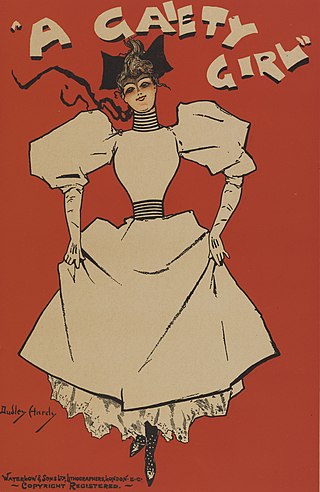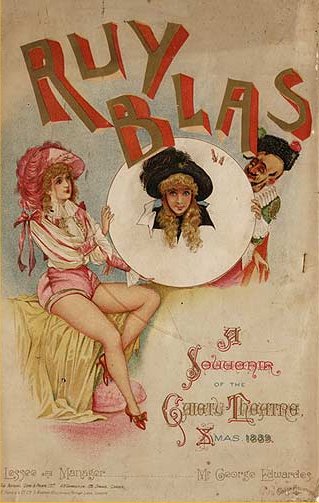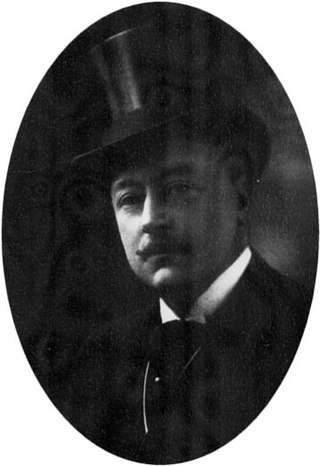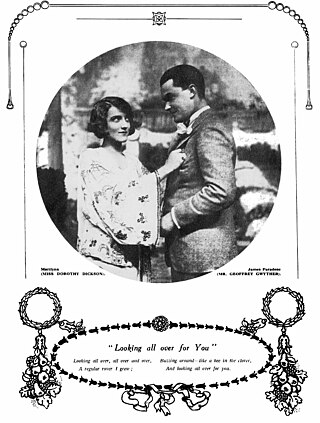
Utopia, Limited; or, The Flowers of Progress, is a Savoy opera, with music by Arthur Sullivan and libretto by W. S. Gilbert. It was the second-to-last of Gilbert and Sullivan's fourteen collaborations, premiering on 7 October 1893 for a run of 245 performances. It did not achieve the success of most of their earlier productions.

The Gillian Lynne Theatre is a West End theatre located on the corner of Drury Lane and Parker Street in Covent Garden in the London Borough of Camden. The Winter Garden Theatre formerly occupied the site until 1965. On 1 May 2018, the theatre was officially renamed the Gillian Lynne Theatre in honour of choreographer Gillian Lynne. It is the first theatre in the West End of London to be named after a non-royal woman.

The Geisha, a story of a tea house is an Edwardian musical comedy in two acts. The score was composed by Sidney Jones to a libretto by Owen Hall, with lyrics by Harry Greenbank. Additional songs were written by Lionel Monckton and James Philp.

His Excellency is a two-act comic opera with a libretto by W. S. Gilbert and music by F. Osmond Carr. The piece concerns a practical-joking governor whose pranks threaten to make everyone miserable, until the Prince Regent kindly foils the governor's plans. Towards the end of the Gilbert and Sullivan partnership, Arthur Sullivan declined to write the music for this piece after Gilbert insisted on casting his protege, Nancy McIntosh, in the lead role; Sullivan and producer Richard D'Oyly Carte, proprietor of the Savoy Theatre, did not feel that McIntosh was adequate.

Richard Barker Cobb Temple was an English opera singer, actor and stage director, best known for his performances in the bass-baritone roles in the famous series of Gilbert and Sullivan comic operas.

A Gaiety Girl is an English musical comedy in two acts by a team of musical comedy neophytes: Owen Hall, Harry Greenbank (lyrics) and Sidney Jones (music). It opened at Prince of Wales Theatre in London, produced by George Edwardes, on 14 October 1893 and ran for 413 performances. The show starred C. Hayden Coffin, Louie Pounds, Decima Moore, Eric Lewis, W. Louis Bradfield, and later Rutland Barrington, Scott Russell, Huntley Wright, Marie Studholme and George Grossmith, Jr. Topsy Sinden and later Letty Lind danced in the piece. Choreography was by Willie Warde. Percy Anderson designed the Japanese costumes for the musical, while the non-Japanese costumes were supplied by leading fashion houses. Blanche Massey was one of the Gaiety Girls in the piece. It also had a successful three-month Broadway run in 1894, followed by an American tour and a world tour.

Filmzauber, literally 'Film Magic', is a Posse mit Gesang in four scenes by Walter Kollo and Willy Bredschneider, with a German libretto by Rudolf Bernauer and Rudolph Schanzer. A parody of silent films, Filmzauber premiered in Berlin in 1912. An English version, The Girl on the Film, translated and adapted by James T. Tanner with additional music by Albert Szirmai, premiered in London in 1913 and was later performed in New York and elsewhere.

Go-Bang is an English musical comedy with words by Adrian Ross and music by F. Osmond Carr.

George Grossmith Jr. was an English actor, theatre producer and manager, director, playwright and songwriter, best remembered for his work in and with Edwardian musical comedies. Grossmith was also an important innovator in bringing "cabaret" and "revues" to the London stage. Born in London, he took his first role on the musical stage at the age of 18 in Haste to the Wedding (1892), a West End collaboration between his famous songwriter and actor father and W. S. Gilbert.

The Girl from Kays is a musical comedy in three acts, with music by Ivan Caryll and book and lyrics by Owen Hall. Additional songs were by Paul Rubens, Howard Talbot, Adrian Ross, Percy Greenbank and others. The farcical story concerns a misguided kiss.

Ruy Blas and the Blasé Roué is a burlesque written by A. C. Torr and Herbert F. Clark with music by Meyer Lutz. It is based on the Victor Hugo drama Ruy Blas. The piece was produced by George Edwardes. As with many of the Gaiety burlesques, the title is a pun.

Cinder Ellen up too Late is a musical burlesque written by Frederick Hobson Leslie and W. T. Vincent, with music arranged by Meyer Lutz from compositions by Lionel Monckton, Sidney Jones, Walter Slaughter, Osmond Carr, Scott Gatti, Jacobi, Robertson, and Leopold Wenzel. Additional lyrics were written by Basil Hood. The show was a burlesque of the well-known pantomime and fairy tale, Cinderella.

Letitia Elizabeth Rudge, known professionally as Letty Lind, was an English actress, singer, dancer and acrobat, best known for her work in burlesque at the Gaiety Theatre, and in musical theatre at Daly's Theatre, in London.

Edwardian musical comedy was a form of British musical theatre that extended beyond the reign of King Edward VII in both directions, beginning in the early 1890s, when the Gilbert and Sullivan operas' dominance had ended, until the rise of the American musicals by Jerome Kern, Rodgers and Hart, George Gershwin and Cole Porter following the First World War.

Edward Laurillard was a cinema and theatre producer in London and New York City during the first third of the 20th century. He is best remembered for promoting the cinema early in the 20th century and for Edwardian musical comedies produced in partnership with George Grossmith, Jr., including Tonight's the Night (1914), Theodore & Co (1916) and Yes, Uncle! (1917).

Primrose is a musical in three acts with a book by Guy Bolton and George Grossmith Jr., lyrics by Desmond Carter and Ira Gershwin, and music by George Gershwin. It centres on a writer whose story-within-a-story forms the basis of the plot. It was written expressly for the London stage, where it ran for 255 performances in 1924 and 1925. The musical played in Australia, but it was not performed in the United States until more than half a century after it was written.

The Cabaret Girl is a musical comedy in three acts with music by Jerome Kern and book and lyrics by George Grossmith, Jr. and P. G. Wodehouse. It was produced by Grossmith and J. A. E. Malone at the Winter Garden Theatre in London's West End in September 1922 and featured Dorothy Dickson, Grossmith, Geoffrey Gwyther, and Norman Griffin in the leading roles.

Rudolph Lewis was a bass-baritone known for creating several small roles in the Gilbert and Sullivan operas including Go-To in The Mikado (1885) and Old Adam Goodheart in Ruddigore (1887).

The Casino Girl is an Edwardian musical comedy in two acts with music by Ludwig Engländer, Will Marion Cook, Will Accooe, Harry Truman MacConnell and Arthur Nevin, lyrics by Engländer, Cook and MacConnell, and a book by Harry B. Smith and Arthur Nevin. The story concerns a former chorus girl at the Casino Theatre in New York, who flees to Cairo under an assumed name to escape amorous advances of an admirer.

Fanny Mackay, better known as Fanny Dango, was a British comedienne, singer and actress who found fame in both the UK and Australia. She was one of the Rudge Sisters. She married a rich Australian grazier and died in Australia.



















